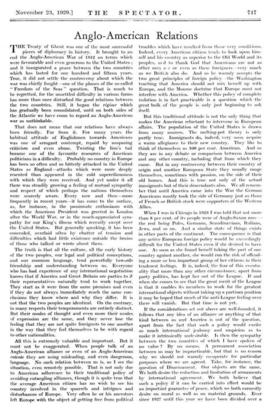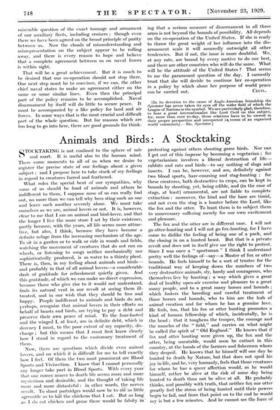Anglo-American Relations
THE Treaty of Ghent was one of the most successful pieces of diplomacy in history. It brought to an end the Anglo-American War of 1812 on terms which were favourable and even generous to the United States ; and it inaugurated a peace between the two countries which has lasted for one hundred and fifteen years. True, it did not settle the controversy about which the war was chiefly fought—one of the phases of the so-called " Freedom of the Seas " question. That is much to be regretted, for the unsettled difficulty in various forms has more than once disturbed the good relations between the two countries. Still, it began the regime which has gradually been consolidated, until on both sides of the Atlantic we have come to regard an Anglo-American war as unthinkable.
That does not mean that our relations have always been friendly. Far from it. For many years the habitual attitude of Englishmen towards Americans was one of arrogant contempt, repaid by unsparing criticism and even abuse. Twisting the lion's tail became one of the favourite resources of American politicians in a difficulty. Probably no country in Europe has been so often and so bitterly attacked in the United States as England—attacks which were more deeply resented than appeared in the cold superciliousness with which they were received. And yet under it all there was steadily growing a feeling of mutual sympathy and respect of which perhaps the nations themselves were scarcely aware. Every now and then—more frequently in recent years—it has come to the surface, as, for instance, in the passionate enthusiasm with which the American President was greeted in London after the World War, or in the much-appreciated sym- pathy for our King's illness which recently swept over the United States. But generally speaking, it has been concealed, overlaid often by chatter of tension and difficulties which had little existence outside the brains of those who talked or wrote about them.
The truth is that all the culture, all the early history of the two peoples, our legal and political conceptions; and our common language, tend powerfully towards friendship and understanding between us. Everyone who has had .experience of any international negotiation knows that if America and Great Britain are parties to it their representatives naturally tend to work together. They start as it were from the same premises and even if they do not always immediately reach the same con- clusions they know where and why they differ. It is not that the two peoples are identical. On the contrary, in many respects their temperaments are entirely distinct. But their modes of thought and even more their modes of expression are the same, and they never lose the feeling that they are not quite foreigners to one another in the way that they feel themselves to be with regard to other nationalities.
All this is extremely valuable and important. But it must not be exaggerated. When people talk of an Anglo-American alliance or even of an Anglo-American entente they are using misleading, and even dangerous, language. No such relation between us is, as I see the situation, even remotely possible. That is not only due to American adherence to their traditional policy of avoiding entangling alliances, though it is quite true that the average American citizen has no wish to see his country involved in the quarrels and intrigues and disturbances of Europe. Very often he or his ancestors left Europe with the object of getting free from political troubles which have resulted from those very conditions. Indeed, every American citizen tends to look upon him- self and his country as superior to the Old World and its peoples, ard to thank God that Americans are not as other men a c or even as these foreigners—very much as we Briti ;h also do. And so he warmly accepts the two great principles of foreign policy—the Washington teaching that America should not mix herself up with Europe, and the Monroe doctrine that Europe must not interfere with America. Whether this policy of complete isolation is in fact practicable is a question which the great bulk of the people is only just beginning to ask itself.
But. this traditional attitude is not the only thing that makes the American reluctant to intervene in European affairs. The population of the United States is drawn from many sources. The melting-pot theory is only partly true. Immigrants do, indeed, very soon acquire a warm allegiance to their new country. They like to think of themselves as 100 per cent. American. And so they are in any debate or comparison between America and any other country, including that from which they came. But in any controversy between their country of origin and another European State they usually range themselves, sometimes with passion, on the side of their old homes. And this is true not only of the actual immigrants but of their descendants also. We all remem- ber that until America came into the War the German Americans mostly took the side of Germany just as those of French or British stock were supporters of the Western Allies.
When I was in Chicago in 1923 I was told that not more than 8 per cent. of its people were of Anglo-Saxon race— the rest being Poles, Germans, Scandinavians, Italians, Jews, and so on. And a similar state of things exists in other parts of the continent. The consequence is that any active European foreign policy would be exceedingly difficult for the United States even if she desired to have one. As soon as she found herself taking the part of one country against another, she would run the risk of offend- ing a more or less important group of her citizens in their tenderest feelings. It is, indeed, the fear of this eventu- ality that more than any other circumstance, apart from party politics, has kept her out of the League. If and when she comes to see that the great merit of the League is that it enables its members to work for the greatest international objects without taking up a partisan position it may be hoped that much of the anti-League feeling over there will vanish. But that time is not yet.
If the considerations set out above are well-founded, it follows that any idea of an alliance or anything of that kind between us and America is out of the question, apart from the fact that such a policy would excite so much international jealousy and suspicion as to make it intrinsically undesirable. Is then the sympathy between the two countries of which I have spoken of no value ? By no means. A permanent association between us may be impracticable, but that is no reason why we should not warmly co-operate for particular purposes where we are agreed. Take, for instance, the question of Disarmament. Our objects are the same. We both desire the reduction and limitation of armaments by international agreement. We both believe that such a policy if it can be carried into effect would be an important guarantee of peace, which we both earnestly desire on moral as well as on material grounds. Ever since 1927 until this year we have been divided over a misevable question of the exact tonnage and armament of our auxiliary fleets, including cruisers ; though even there we have been agreed on the broad principle of parity between us. Now the clouds of misunderstanding and misrepresentation on the subject appear to be rolling away, and there is every reason to hope and believe that a complete agreement between us on naval forces is within sight.
That will be a great achievement. But it is much to be desired that our co-operation should not stop there. Our next step must be to convince, if we can, the other chief naval states to make an agreement either on the same or some similar lines. Even then the principal part of the policy remains to be accomplished. Naval disarmament by itself will do little to secure peace. It must be accompanied by a like policy for land and air forces. In some ways that is the most crucial and difficult part of the whole question. But for reasons which are too long to go into here, there are good grounds for think- ing that a serious measure of disarmament in all three arms is not beyond the bounds of possibility. All depends on the co-operation of the United States. If she is ready to throw the great weight of her influence into the dis- armament scale it will assuredly outweight all other tendencies. But if not, the issue is more doubtful. We,, at any rate, are bound by every motive to do our best, and there are other countries who will do the same. What will be the attitude of the United States ? That seems' to me the paramount question of the day. I earnestly trust that she will decide to continue her co-operation in a policy by which alone her purpose of world peace [In its devotion to the cause of Anglo-American friendship the Spectator has never taken its eyes off the wider field of which the League of Nations is the symbol. We are particularly glad, therefore, to hear a great internationalist like Lord Cecil on this subject, for, more than ever to-day, those relations have to be viewed in their proper perspective and interpreted Lire terms of an organized world community.—En. Spectator.]































































 Previous page
Previous page